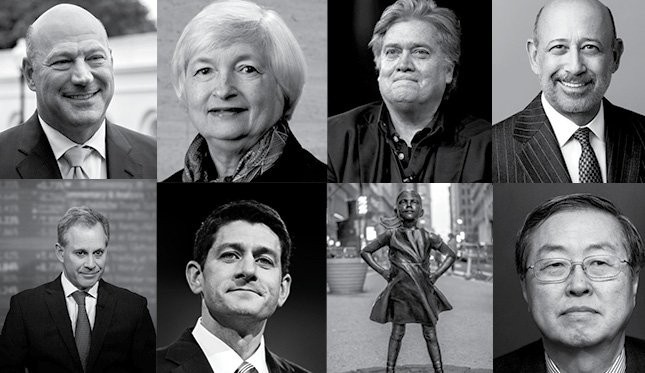This has been a year of enormous change, and turnover on the Power 100 ranking reflects electoral, social and economic turmoil in the U.S. and abroad. Those who didn’t make it back on to this year’s list were dropped for a variety of reasons, some honorable, others not so much. And a few may be down, but not entirely out.
The disruption begins with Donald Trump, of course. When Trump took office in January 2017, he brought with him a new crop of political operators and advisors and a system of chaotic management that has turned the White House into a meat grinder. Obama-era appointees, such as Fed chair Janet Yellen (2017 ranking: 06) and CFPB director Richard Cordray (2017 ranking: 63) were pushed out. In Congress, former Republican standard-bearers struggled to keep up with the populist flood and Trump’s demands of fealty: Speaker of the House Paul Ryan (2017 ranking: 32) announced in April that he wouldn’t run for reelection, and chairman of the House Financial Services Committee Jeb Hensarling (2017 ranking: 34) made a similar decision in October of the previous year.

Then there are those who were sucked into the Trump vortex and prematurely spat out. While erstwhile White House communications director Anthony Scaramucci seems to be regaining his footing, many have not. Former Goldman Sachs president and COO Gary Cohn (2017 ranking: 14) is a case in point: He left the bank to serve as chief economic advisor to the president and director of the National Economic Council only to resign barely a year later over disagreements about tariff policy. Fellow Goldman Sachs alumnus and former Breitbart News executive chairman and West Wing Svengali, Steve Bannon (2017 ranking: 74), met a similar fate one week after a neo-Nazi rally in Charlottesville, Va. Neither seems to have figured out the aftermath.
Speaking of Goldman Sachs, at least one departure at the powerful investment bank was a happy story: Longtime CEO Lloyd Blankfein (2017 ranking: 22) decided to retire after more than a decade in the top post. Similarly, California governor Jerry Brown’s (2017 ranking: 12) final term is drawing to a close, even as he’s maintained the state as a bulwark against Trump administration policies on immigration and environmental issues. On the other side of the world, Zhou Xiaochuan (2017 ranking: 31), who led the People’s Bank of China through 15 years of liberalization, also stepped aside, to great acclaim.
Back on the Eastern Seaboard of the United States, New York played host to some seamier departures. Fearless Girl (2017 ranking: 19), the statue of the young girl staring down the Wall Street bull with moxie, a symbol of women’s empowerment funded by State Street Global Advisors, got fact checked: It turned out State Street had been systematically underpaying its female employees and paid a $5 million settlement as a result. Meanwhile, New York attorney general Eric Schneiderman (2017 ranking: 45), who had built a reputation as an aggressive liberal prosecutor and was seen as a Trump bête noire, abruptly resigned in May following the bombshell accusation that he had physically abused and choked at least four women while serving as AG.

In the world of banking, Wells Fargo CEO Tim Sloan (2017 ranking: 100) slipped off of the list. He’s trying hard but has yet to stop the drip, drip, drip of scandals and fines leaking out of one of the world’s biggest banks. The board even reportedly tried to replace him in September, but its top choice for the job, the unemployed Gary Cohn, turned the offer down.









